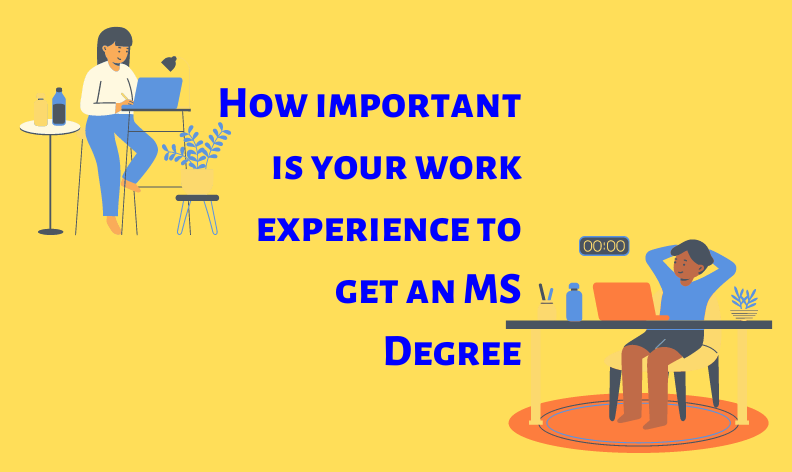Blog 
 Back
Back

How important is your work experience to get an MS Degree
If you’ve already started looking for suitable Master’s programs and thinking about your career goals, you’ll know that most Master’s programs are geared toward recent Bachelor’s degree graduates with little to no work experience.
However, depending on your field of interest, some programs will have specific requirements or preferences regarding your professional experience and academic background. If you still are confused and can’t decide if you want to go ahead with your Master’s degree, or would like to gain some work experience before, then continue reading our blog!
Why wait for a Master’s degree?
1. Know about your area of interest in your field of choice
Waiting until you have some work experience will allow you to discover what areas of your field interest you. Master’s programs are typically very technical, and once you have a degree in that field and are working, you may find it difficult to realize that you are not interested in this area of your field. A long-term goal can help you envision which field you want to work in, in the future. So, gaining some experience ahead of time can help you make a more informed decision about what you like and dislike.
2. Work experience during your studies will enhance your resume
There are numerous reasons why companies may be reluctant to hire graduates with no work experience in today’s world. It costs a lot to train a new employee to do the job. While academic credentials are important, companies typically seek candidates who have already developed real-world skills and have some experience, even if it is in the form of an internship in the same industry.
Gaining work experience before beginning your Master’s program may make it easier to find work after graduation.
3. To gain experience while switching streams of study
Irrelevant work experience is useless when applying for a Master’s degree. However, if you try to gain some industry knowledge in the field in which you intend to pursue your Master’s degree, it can help your profile. If you are switching streams, you will benefit from gaining some experience in your target field because you will likely have less background knowledge than other students who have already pursued that field during their Bachelor’s degree.
4. To gain hands-on, on-the-job experience
Work experience is usually preferable to internships because it provides a better understanding of the working environment. Getting real-world experience can also help you better understand the concepts taught in class, which can give you an advantage during your Master’s degree. While working, you will have the opportunity to observe and learn more from a mentor and how they handle a specific case.
5. To pass the time while applying for or deferring to another semester
Work experience can be beneficial if you have some time before applying to college. If you plan to defer to the following year or apply for the following fall or spring semester and want to do something in the meantime, working at a company can help you improve your skills and build your profile.
Why continue your education right away?
1. To prove your determination to complete your specialization
Work experience is a nice addition to your CV, but it is not a major consideration when your application is reviewed for admission. There are numerous advantages to pursuing a Master’s degree immediately after completing your Bachelor’s degree. Students who can earn a Master’s degree, with or without real-world experience, demonstrate their ability to envision and achieve long-term goals.
2. To build a foundation before you start your career
Furthermore, a Master’s degree can help you build a foundation in your chosen field of study, which will help you when you gain first-hand experience in that industry. Some fields of science and health (for example, medicine) place a premium on classroom learning before applying those skills and working in the real world.
3. To wait out the economic recession
If there is an economic weakness in the job sector, you can choose to continue your university education after completing your Bachelor’s degree. You can make better use of their time and energy by gaining more knowledge, which will put you in a better position when applying for jobs.
College enrollment rises during recessions, as expected. Before enrolling, you should consider the future and research job market trends. This will help you determine whether your chosen field of study will provide job opportunities after you graduate. In conclusion, Work experience can help you learn new skills, raise your profile, and build your CV. Even though it can give you a slight advantage, it isn’t entirely necessary for college admissions.
To know more about student loans to study at the best university for your master’s degree, log on to Kuhoo.com or contact us at contact@kuhoo.com



